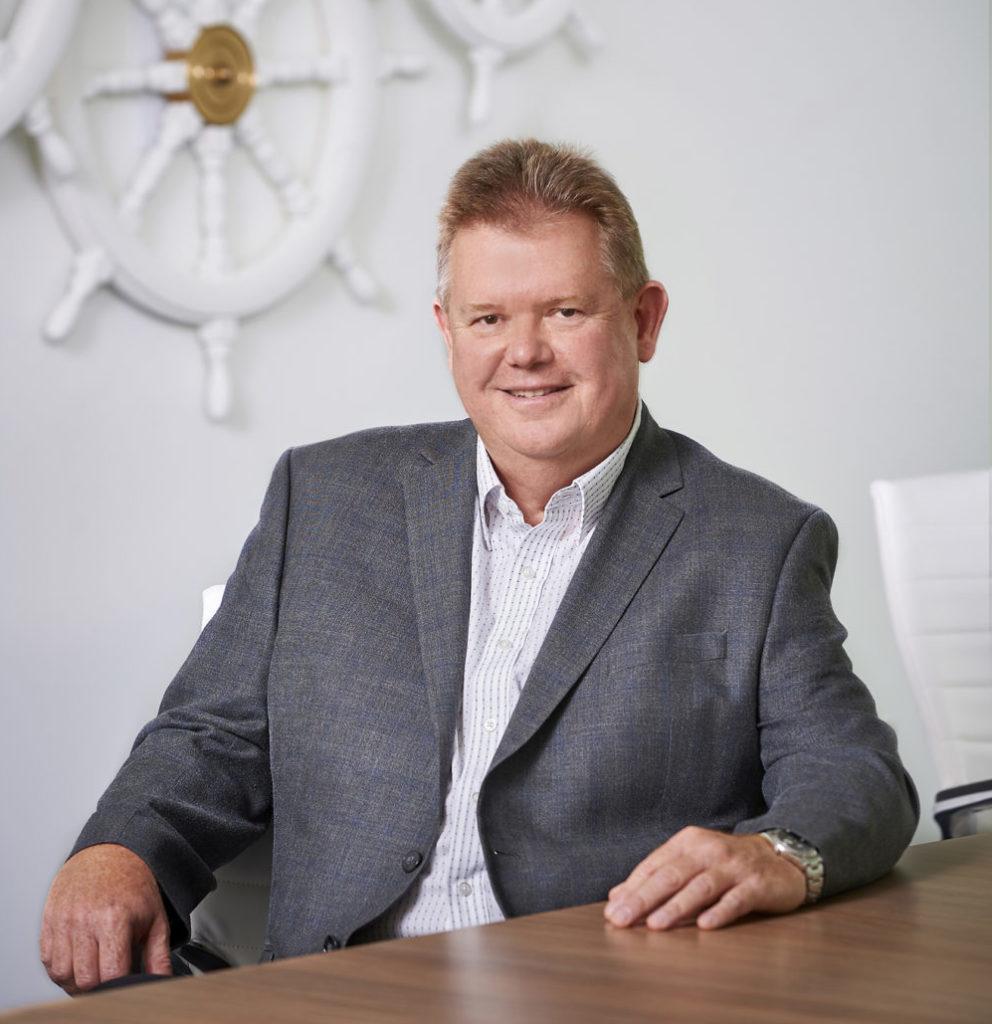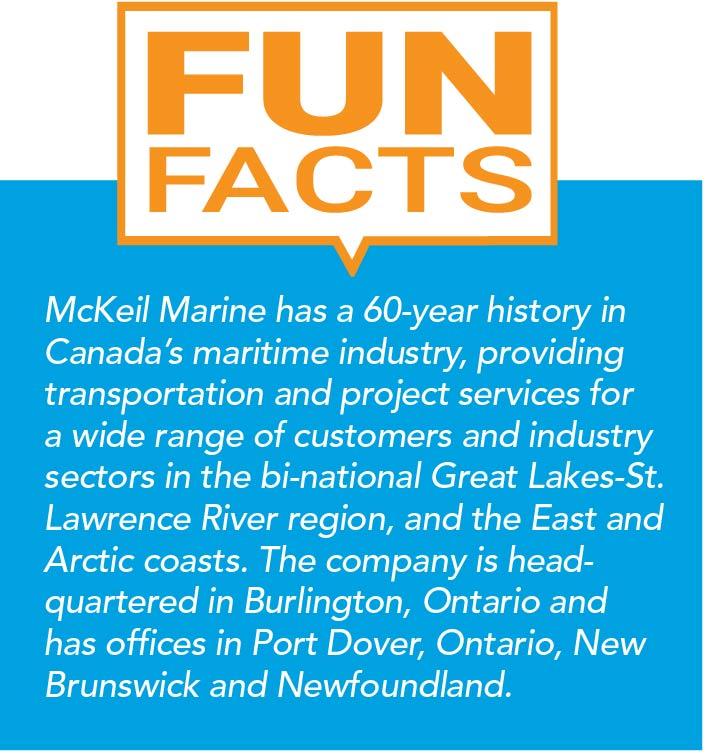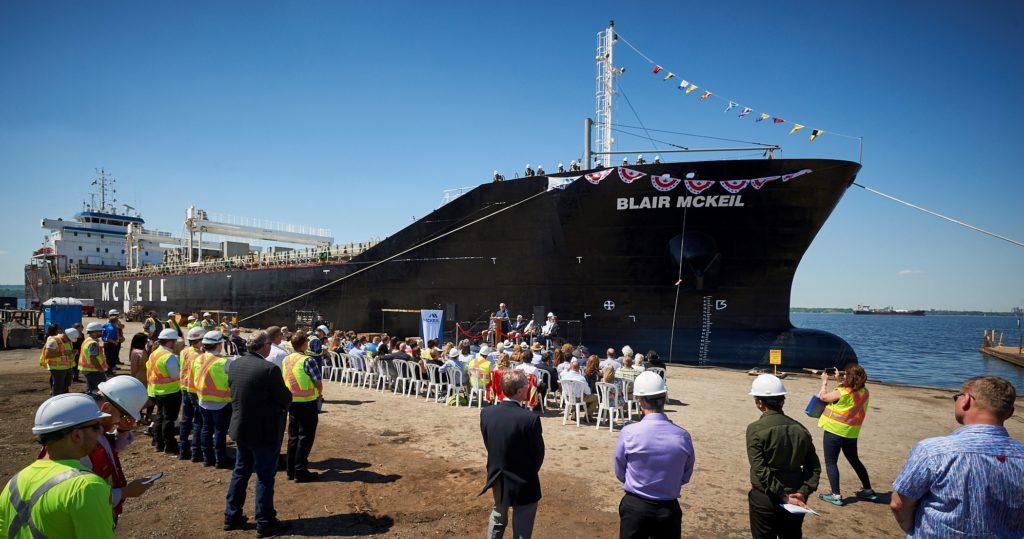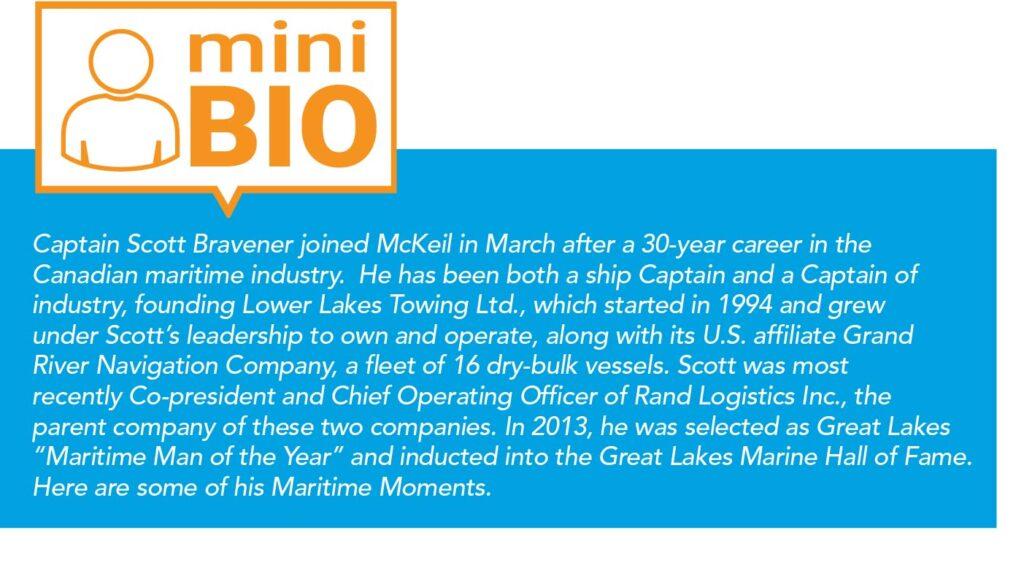
Captain Scott Bravener, President of Canadian shipoperator McKeil Marine, discusses new ships, new markets and new recruits
Q: You joined McKeil Marine as its new President in March. What attracted you to the company?
A: I wasn’t actively looking to leave Lower Lakes (my previous company). I’ve been friends with Blair McKeil, the former owner of McKeil, for over 30 years. He said there was an opportunity and once I sat with the owners and they laid out their vision of where they were going with it, it represented an exciting, new challenge. McKeil is one of the only growing companies on the Great Lakes and I enjoy growing and building things. McKeil has been entering new markets like the tanker sector, something that I hadn’t done before which also posed a new challenge.
Q: There has been quite a bit of change at McKeil Marine in the last few years, with a new ownership structure – what’s the vision for the company going forward? How are you helping to shape that since you joined?
A: The company has transitioned over the years from a tug and barge project-based business to also focus on the transportation end of the business – which is my area of expertise. Where we have really been growing is in niche transportation – targeting companies or ports that require smaller, specialized vessels. That was an area where the owners thought I could really add value and help them develop the people to enable them to do that. This company has always been innovative in providing solutions to their customers. My previous experience was in servicing a niche market and we are hoping to apply some of the same operating principles here.

Q: From a geographic point of view, is the vision to continue focusing on the Great Lakes, East coast and Arctic?
A: Yes, but we’re also looking at potentially expanding into other markets where its complementary to our business. But our primary focus is still on developing our Great Lakes/Eastern seaboard business.
Q: What about the Arctic? Is there potential for growth?
A: That’s an area of growth for both of our sides of business – both the project side, delivering equipment and infrastructure components as new developments and mines open up in the North, and our transportation business, as opportunities arise to move materials out of those facilities.
Q: McKeil has been expanding its operations and has added three vessels to its Canadian-flag fleet just in the last six months. Tell me more about that. What’s driving this company growth?
A: Recent growth has been primarily driven by our expansion into the domestic tanker market. That’s an area of our business we hope to develop further. That’s driven the addition of two new vessels to our fleet. The two tanker vessels are on long-term charter to PetroCanada Lubricants. We’re bringing the feed stock from refineries in Come by Chance and Montreal to their lubricants facility in Oakville, Ontario. The end products they manufacture from that are bulk lubricants for industrial, commercial and residential uses. The third new vessel builds upon our existing bulk trades in the Great Lakes and Eastern seaboard.

General cargo ship BLAIR MCKEIL joined the fleet in 2019 and will trade throughout the Great Lakes, carrying a variety of cargo including cement, quartz, coke, salt and gypsum.
Q: What’s the number one challenge for McKeil Marine to navigate for its continued success?
A: Workforce development. As a growing company, prior to my arrival, McKeil was primarily recruiting from outside the organization. That’s not a sustainable approach. At my previous company, we had one of the youngest and best trained workforces in the domestic industry. We developed it primarily from the ground up over the years. We’re putting an emphasis at McKeil to grow our own people now. With the commitment, dedication, and hard work that I’ve observed amongst crew on our vessels, I know these efforts today will yield long-term benefits for us. Recruitment from the schools, but also the development of our existing people and bringing new people into the industry.
We can only grow as fast as we can develop our own people. There’s a shortage industry wide.
One of the things that makes McKeil an attractive place to work is the lifestyle and the rotations (time onboard the ship and off) and the culture of the organization. That’s what we are going to take advantage of for recruiting purposes and then developing people once they are in the organization. We are unique in that we maintain a personal relationship with all our employees, more of a family-oriented company. That’s something we’re spending time fostering and building up.
Q: During your recent growth, you have added 60 new employees. What kind of skills and talent are you looking for in the next generation of mariners?
A: Especially in the central region, the training has been more oriented towards navigational and technical aspects. I’d like to see more administrative and business- oriented training to create more opportunities for the students coming into the industry so that they are not restricted to just working on the vessels. If you look at all the companies, people have come from the vessel workforce to fill landside management positions. But they’ve had to acquire those business skills through experience and the school of hard knocks once they’ve come ashore. It would be helpful to have more of that kind of training in the schools for students right from the start.
Technology is also becoming a much larger part of our business. The technology on the vessels is changing rapidly. We’re always looking at ways to serve our customers better with niche ways of unloading the vessel and using different kinds of equipment. You must have a degree of technological savvy to operate today’s vessels.
Q. Marine shipping is not always top of mind when people are thinking about future career choices. Given all the experiences you have had, including starting your own company from scratch, what would you tell someone to get them excited about joining the marine industry?
A: You must be a bit of a free spirit because you are away from home for a period of time. But in the time off, you can travel and do a lot of things you can’t do in a shore-side position. As part of the rotation system, crew members can be off for a month or more at a time.
If you work onboard a ship, you wake up in a different place every day and you are doing something different every day. If you’re an adventurous type, it’s a pretty exciting lifestyle. There’s also opportunity for rapid advancement and the pay and benefits are quite good.
If you enjoy technology and machinery, it’s also very rewarding work. On the deck side, you’re moving very large ships in very tight confines which can be quite exciting and on the engineering side, you are dealing with some pretty massive pieces of machinery.
And finally, probably most importantly, the camaraderie aboard the vessels is a great benefit. The people at McKeil are a very close-knit group.

Best View from the Bridge: Sunsets and sunrises. Long Point Lighthouse in Lake Erie was always great for me to see, because that’s where I grew up spending a lot of time on my father’s fishing tugs.
Best Meal in the Galley: Liver and Onions with Chef Richard Ball on the Cuyahoga because it’s a British specialty. I can’t get it at home.
Batten Down the Hatches (Worst storm experienced on a ship): Back in the early 1990s, I was on steamship Halifax coming out of Halifax one time in a confused sea in the ballast condition, which was quite a wild ride. We went out and came back in after a few hours of taking quite a pounding.
Plain Sailing (Proudest career moment): At the AGM for Lower Lakes and Grand River Navigation, when it was announced I was leaving the company, the reception I got from the captains and the chiefs was really moving. It really reinforced what we had created and the difference we had made, and how we had impacted so many lives.